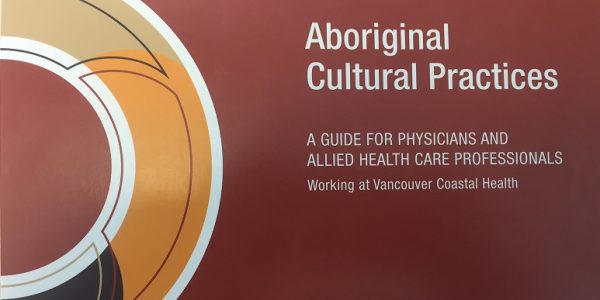Aboriginal Cultural Practices: A Guide for Physicians and Allied Health Professionals working at VCH
Introduction
Over the past year, the Aboriginal Health team has been consulting and collaborating with First Nation communities as well as the First Nations Health Authority to develop a brand new health care resource for physicians and allied health professionals working with Indigenous patients. Improving the health status of Aboriginal patients is a key priority for VCH. Research has shown that when cultural safety strategies have been implemented, health outcomes have improved.
Background
In July 2015, our CEO Mary Ackenhusen, along with the CEOs of the other five provincial health authorities, First Nations Health Authority and the Ministry of Health signed the Declaration of Commitment to demonstrate their commitment to advancing cultural humility and cultural safety within health services. More recently in March 2017, 23 health regulatory bodies including nursing, social work, physicians and surgeons, dental hygienists, dieticians and occupational and physical therapists have also signed this declaration.
Guidelines & Cultural Practices book
Working in partnership with the First Nations Health Authority, VCH is mandated to improve health services and health outcomes for Indigenous people in our region. We have an Aboriginal Cultural Competency policy CA_5200 to guide us in this work. Since the policy is located on VCH Connect, you will need a VCH computer to access the document.
The guidelines in this VCH Aboriginal Cultural Practices guide are supported by this policy and by Aboriginal cultural safety training initiatives.
What you need to know
- These cultural guidelines aim to help VCH acute care staff to provide culturally responsive health care services to Aboriginal clients. The guidelines are underpinned by values, practices and concepts of health common to Aboriginal people in the communities we serve.
- There is great diversity amongst Aboriginal people in the VCH region and these guidelines should not replace finding out an individuals preferred means of healing and care.
- The book is tabbed for quick reference. On the left side of each page is an explanation of the term being referenced with the protocols bulleted in the main space of the page. Some of the key concepts discussed include:
- Information/Communication – the importance of understanding different communication styles.
- Discharge Planning – the importance of identifying and accessing external supports.
- Healing and Medicines – information about incorporating traditional medicines and practices.
- Dying and death – information on cultural and spiritual considerations.
- Aboriginal Communities – key contact information and a brief description of each First Nation community in the VCH region.
Copies will be distributed to each unit. If you have any questions about this resource or would like to receive a copy, please get in touch with our Aboriginal Patient Navigator team. You can also check out the Aboriginal Health page on the VCH.ca.
Email: info.aboriginalhealth@vch.ca
Toll-free: 1 (877) 875-1131

